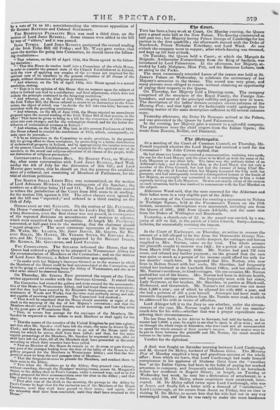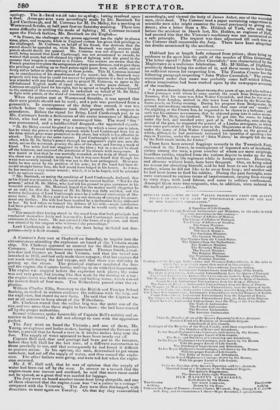A duel was fought on Saturday morning between Lord Castlereagh
and M. Gerard De Melcy, husband of Madame Grisi. The Morning Post of Monday supplied a long and grandiose account of the whole affair : from which we learn, that Lord Castlereagh had made himself conspicuous in his applause of Madame Grisi from the "omnibus box " at the Italian Opera, had been in the habit of paying her marked attention in company, and frequently exhibited himself on horseback before her residence in Regent Street ; at length, on Tuesday or Wednesday last week, he sent her a declaration of attachment, in a letter, which M. De Melcy, whose suspicions were awakened, inter- cepted. 13T. De Melcy called twice upon Lord Castlereagh, who was at Ascot, and finally left a letter with a demand of " satisfaction." Lord Castlereagh, on his return from Ascot on Friday, lost no time in visiting M. De Melcy, to assure him that his wife had not in any way encouraged him, and that he was ready to make the most handsome apology. The h at band wOald take no apologe, having resolved upon a duel. Arrargen eats were accordingly made by Air. Bentinck for Lord Castlereagh, and M. Cottreau for M. De Melcy, for a meeting at Wormwood Scrubs, at half-past four on Saturday morning. There was some difficulty in settling the mode of fighting ; M. Cottreau insisted upon the French fashion, Mr. Bentinck on the English- " In France, the challenger or the person aggrieved has the right to dome time, place, and weapons, while in England custom has given that privilege to the challenged. M. Cottreau, on behalf of his friend, was desirous that the sword should be appealed to, while Mr. Bentiuck was equally anxious that pistols should decide the quarrel. Mr. Cottreau was not disposed to yield, until, being assured that Lord Castlereagh was not accustomed to swords, he waived that point, but still claimed his right of fighting with the pistol in the almoner that weapon is resorted to in France. Our readers are aware that the French practice is to place the antagonists at forty paces distance, and to give them the privilege of walking up to fixed points eight paces from each other, and of firing either before or after arriving at those points. This M. Cottreau insisted on, in consideration of his abandonment of the sword ; but Mr. 13entinek very properly told him that he could not answer for public opinion if a duel so fought was attended with any fatal result, and he prayed M. Cottreau, to agree to the old.fashioned English mode of equal chance, at twelve paces distant. Al. Cottreau struggled hard for his right, but he agreed at length to submit himself to the customs of this country, and he undertook on behalf of 31. De Melcy to fight with pistols, at the word of command, at twelve paces."
When the parties met at Wormwood Scrubbs, it was agreed that their own pistols should not be used ; and a pair was purchased from a gunsmith's. In consequence of the delay thus caused, it was ten o'clock before the combatants took their ground, with a surgeon in attendance. Before the signal for firing, Lord Castlereagh put in to Mr. Cottreau's hands a declaration of the entire innocence of Madame Grisi, who had not in any way encouraged him. The word " fire " was pronounced, and a handkerchief dropped—the appointed signals.
"Al. De Melcy carried his piste] in a manner by which a surer aim is taken, but by which the person is wholly exposed, while Lord Castlereagh bore his in the form which gives some protection to the chest, but which is less effective in attack. They fired at the same instant. Lord Castlereagh's ball did not take effect, while M. De Melcy's passed through his antagonist's right arm near the wrist, across the waistcoat, grazing the akin of the chest, and leaving a track of blood. The noble lord was staggered by the blow ; but in a second he shook off the faintness, and received the attentions of his friends with composure. It was feared at first that he was mortally wounded, as the train of blood across the chest was a formidable symptom ; but it was soon found that though his wrist was severely injured, his life was not in the least endangered. Most pro- bably he was saved by the position of his arm ; for if the -hand had been di- mmed straight before him, the ball would have lodged in his breast. As it was, be has received a very severe wound ; which, it is to be hoped, will be attended with no serious result.
" Mr. Bentinck, on seeing the condition of Lord Castlereagh, declared, that as his friend was wounded, the affair could not be carried further. "Not for the present," added AL De Meley, who had left his ground to give assistance to his wounded adversary. Mr. Bentinck hoped that the matter would altogether be at an end; for that the honour of :11. De Melcy was fully satisfied, and the written declaration of Lord Castlereagh must be a sufficient vindication of Ma- dame Grisi. 31. De .Meley said that he was not desirous of cart ying his resent- ment any further. His wife had been insulted by a declaration being addressed to her. He had taken on himself the defence of his wife—ample satisfaction bad been given—and he was ready to declare that he would carry the affair no further.
The seconds then baying stated in the usual form that both principals bad conducted themselves fairly and honourably, Lord Castlereagh received every assistance at their trawls. Ile was carried t the house of a peasant, and there was attended by the surgeon who witnessed the proceedings."
Lord Castlereagh is doing well ; the hurt being declared not dan- gerous—only a flesh wound.



























 Previous page
Previous page